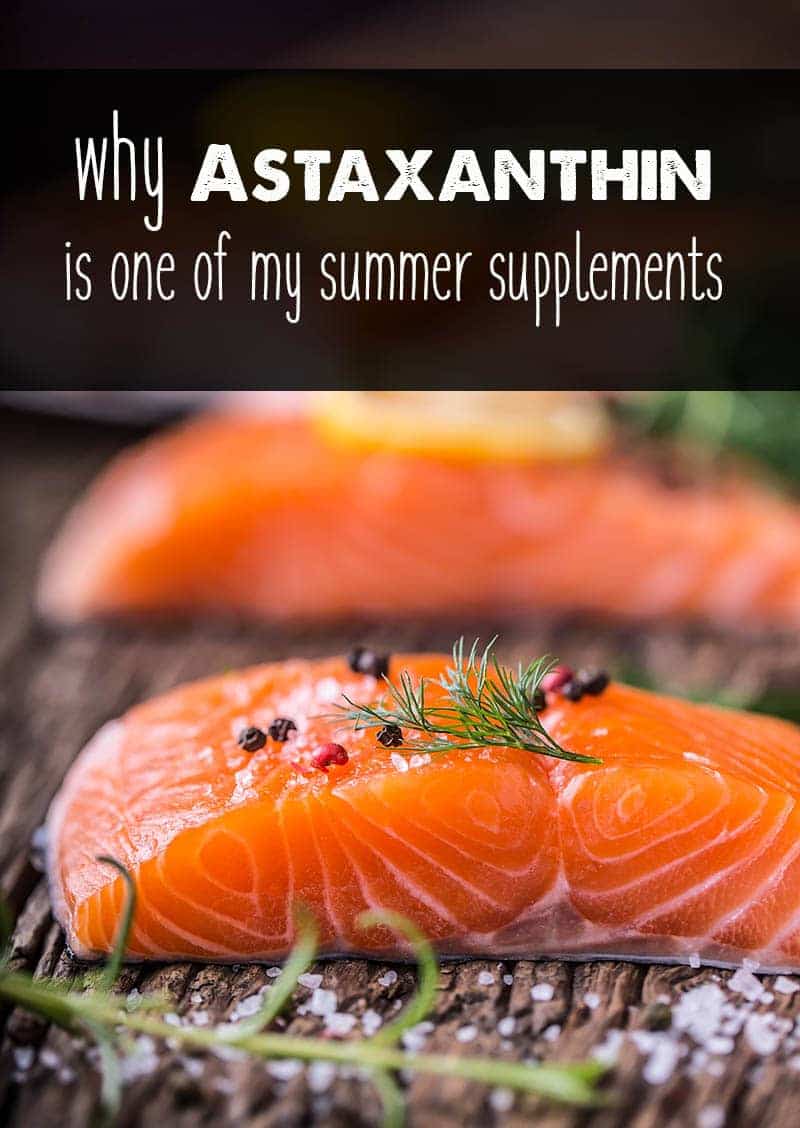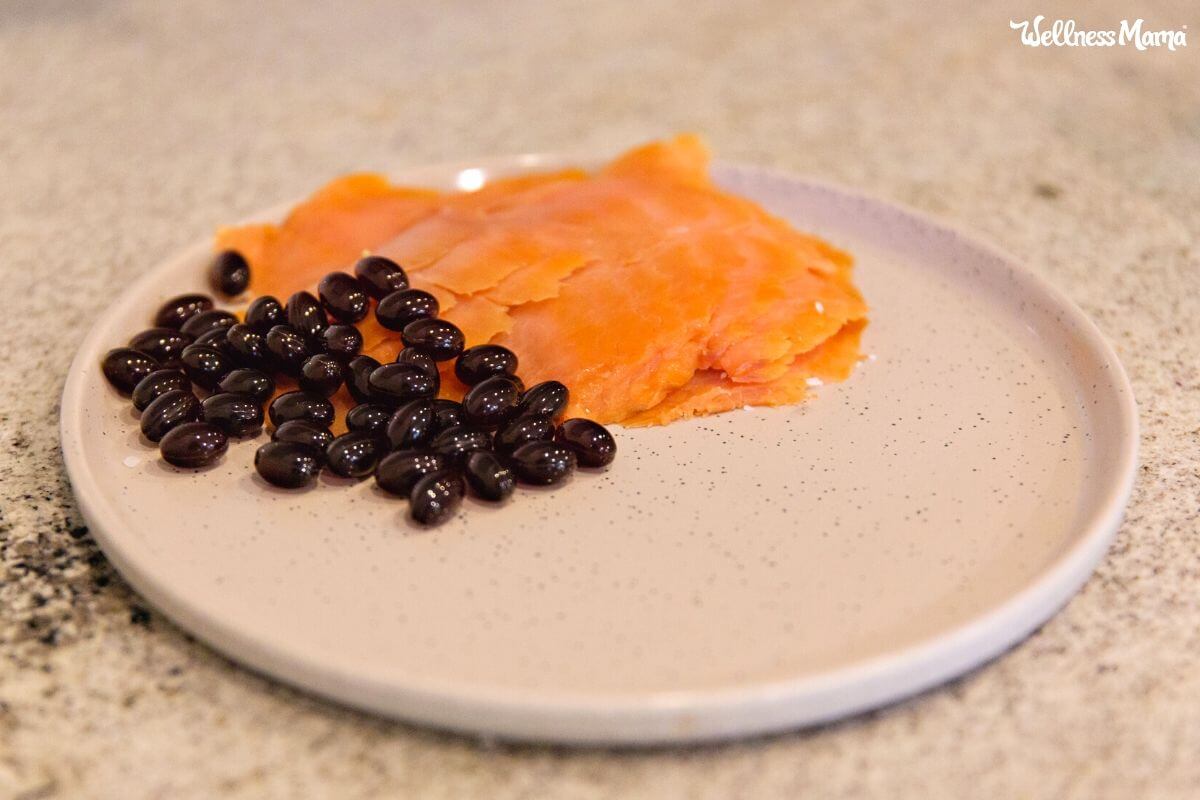Astaxanthin is my go-to summer supplement, and it’s often called nature’s strongest antioxidant. It is a potent naturally occurring carotenoid found in foods like salmon and krill.
There are many well-researched reasons for taking this supplement, but I take it for one very noticeable benefit: sun protection.
My results have been drastic. Before supplementing, I could burn after just 15 minutes in the sun. Now, I can handle moderate (and healthy) sun exposure without burning at all.
I guess you could say I eat my sunscreen!
What Is Astaxanthin?
Astaxanthin (pronounced asta-zan-thin) is a naturally occurring carotenoid found in seafood and sea life, like crustaceans and microalgae. According to the Linus Pauling Institute, carotenoids are a class of over 750 richly colored molecules synthesized by plants, algae, and photosynthetic bacteria.
Carotenoids are responsible for the bright colors of plants and vegetables. While you probably knew that beta carotene is orange, astaxanthin is responsible for the red colors seen in flamingos, salmon (especially sockeye salmon), and krill. Interesting fact, it is the higher astaxanthin content that gives wild-caught salmon a brighter red color than their farmed counterparts.
Astaxanthin is one of the most powerful carotenoids. It is produced in nature as a protectant itself from the effects of losing its nutrient supply and to stay alive. This explains why it’s found in very high amounts in salmon. They need it for the endurance to swim upstream!
Plus, astaxanthin is an incredibly potent antioxidant. While other types of antioxidants can become pro-oxidant, or harmful, during the digestive process, astaxanthin retains its broad range of health benefits.
Top 5 Benefits of Astaxanthin
While I take astaxanthin mainly for its protective effects against the sun, there are lots of amazing benefits of this super antioxidant.
Here are the top five ways your immune system and other bodily functions may benefit:
Fights Pain and Inflammation
If you thought vitamin C was a powerful antioxidant, consider this: astaxanthin is shown to be up to 6,000 times as potent! All antioxidants can fight free radicals to help reduce inflammation, but astaxanthin offers several unique properties that make it especially beneficial.
First, it has a unique ability to cross the blood-brain barrier. Animal studies show that this can help reduce neuroinflammation and might be protective against certain brain injuries. This might also be helpful for those with Alzheimer’s Disease or other cognitive diseases.
Taking this dietary supplement might increase your eye health as well. Astaxanthin can also cross the blood-retinal barrier to directly reduce inflammation in the eyes.
Astaxanthin also might also offer general pain relief for things like joint inflammation, especially carpal tunnel syndrome and rheumatoid arthritis. It’s also great for soothing muscle soreness and sports injuries.
Boosts Endurance
If your workout routine needs a boost (or if you’re suffering from muscle damage), you might want to consider supplementing with astaxanthin.
Athletes are especially likely to see positive effects from taking this supplement. One clinical trial of healthy paramedic students found that taking astaxanthin for six months significantly increased the number of squats they could do — up to three times as much as the placebo group.
In addition to boosting strength and endurance, astaxanthin’s ability to fight free radicals helps speed up recovery time. In other words, the lack of muscle soreness after exercising might also play a role in its ability to increase strength and endurance.
Protects Against Sun Damage
One of the main reasons I started taking astaxanthin is because of its impressive sun-protective benefits. It works by reducing the UVA damage to skin cells from the inside. I am naturally fair skinned and this supplement allows me to get healthy sun exposure without burning or getting freckles.
Astaxanthin’s unique sun protective properties come from the algae Haematococcus pluvialis, which creates this pigment as a protection from the heat and sun to save itself when it loses its water supply. Similarly, astaxanthin works as an internal sunscreen for humans and gives skin a subtle, natural reddish-brown pigment while it protects against DNA damage.
Getting a sunburn means your body is suffering through a type of inflammation. If there are other sources of inflammation in the body, your skin is more likely to burn. My lab results found that since taking astaxanthin regularly and eating an anti-inflammatory diet, I have lower levels of inflammation and I tan more easily without burning.
Plus, the extra boost in skin moisture from taking astaxanthin doesn’t hurt!
In case you’re wondering, here’s how to make your own natural sunscreen that you can use together with astaxanthin for superior sun protection.
Contains Anti-Aging Properties
If your beauty routine needs a boost, consider getting more astaxanthin. You’ll naturally reap the cosmetic benefits due to its antioxidant activity. Specifically, its ability to fight free radicals.
Since this pigment can protect our cells and DNA to fight against oxidative damage, it helps boost skin elasticity, reduces the size of age spots, and even helps smooth out wrinkles.
Research finds that after just four to six weeks of taking astaxanthin, participants noticed a reduction of UV-related aging and overall improved skin health.
Might Ease Cardiovascular Disease
Turns out that the antioxidant effect of astaxanthin can be beneficial to those with heart disease as well.
While more research needs to be done, recent studies found that use of astaxanthin led to a reduction in biomarkers of oxidative stress, which helped improve overall heart health.
Plus, animal studies find that eating an astaxanthin-rich diet can lower blood pressure in hypertensive rats.
How I Use It
I consider astaxanthin more of a food than a supplement, and I try to consume it as part of a healthy diet. I love seafood, so no problem there! Wild-caught salmon is a regular part of our diet, and we get ours here.
That being said, it would be very difficult to get large amounts from food. There are also mercury concerns with consuming high levels of seafood.
I’ve been using this supplement daily for several years, especially during warmer months when the sun is strongest. I typically take one 12 mg of astaxanthin each day, usually in the morning and with a meal or drink that contains fat, like my healthy coffee or tea.
For best results, start with this supplement well before summer to build up your system and prepare for enjoying the sun safely!Safety of Astaxanthin
Supplementing with astaxanthin is likely safe. Side effects might include stomach pain if you take high doses. You might also need to take more frequent trips to the bathroom, and don’t be alarmed if your stools are a reddish color.
Since there aren’t enough studies to prove that it’s safe, it is probably best to avoid supplementing with astaxanthin if you’re pregnant or breastfeeding.
The Bottom Line
Astaxanthin is a powerful antioxidant that can help improve your skin, benefit your heart and brain, and protect your skin against aging and sun damage.
I’ve found it to be helpful for me personally, but I’m not a doctor and can’t tell you what would work best for you. As with any other changes to your diet, be sure to check with your healthcare professional before starting astaxanthin supplementation.
Of course, adding a bit of extra salmon or krill to your diet can only be beneficial!
Have you ever taken astaxanthin? Did you notice any benefits? Share below!





Leave a Reply